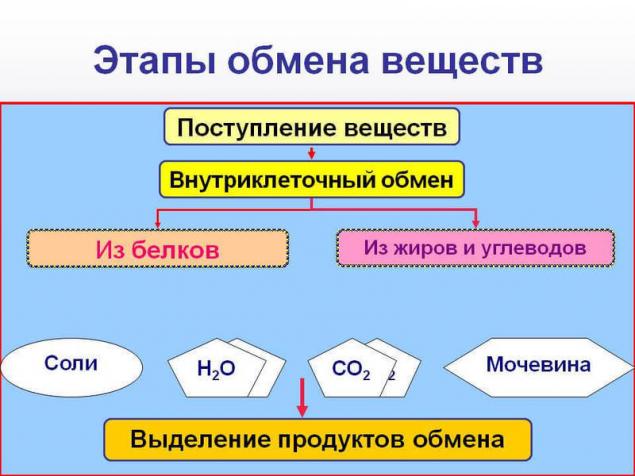826
Metabolic disorders: what you need to know
Metabolism - a set of chemical reactions, providing the vital activity and cell growth
. Metabolism - is what is the basis of a living organism, it is an exchange between the chemical composition of human and environmental
. The metabolic processes of the body are involved all the chemical and natural elements - proteins, fats and carbohydrates. Fulfilling every role - proteins, creating a building material, and fats with carbohydrates, adjusting energy consumption balance - they are clearly and consistently communicate with each other. They come in aid of minerals and vitamins that improve cellular environment.

Metabolism consists of two processes:
1. Dissimilation - decomposition, decay nutrients
. 2. Assimilation - synthesis, the creation and assimilation of new substances
. These processes are parallel life. There are the following stages:
1. Receipt of nutrients in the body.
2. Absorption of them from the digestive tract.
3. Redistribution and assimilation of nutrients (textile stage).
4. Allocation of residues of degradation products, which can not be absorbed in the body.

metabolic processes in the body are rapidly and extensively, although there is no high pressure and temperature. This speed is provided by the participation of enzymes and other substances.
The role of metabolism
Metabolism deserves to give him the most attention. Because of its streamlined operation depends on the supply of our cells useful substances. The basis of the metabolic chemical reaction occurring in the human body. The substances necessary for the life of the organism, we get from food.
In addition, we need more oxygen, which we breathe in with the air. Ideally, one should observe the balance between the processes of construction and decay. However, this balance can often be disrupted and there are lots of reasons for this.
Causes of metabolic disorders
One of the first causes of metabolic disorders can be identified the hereditary factor. Although he is incorrigible, can and must fight it!
Also, metabolic disorders can be caused by organic disease. Often, however, these disorders are a consequence of our poor eating habits.
As an overabundance of nutrients, and the lack of them is very harmful to our body. And the consequences may be irreversible. The excess of certain nutrients occurs due to excessive consumption of fatty foods and lack - in strict compliance with various diets for weight loss. The main diet is often a monotonous diet, which leads to shortfall in essential nutrients, in turn, will inevitably lead to the development of various diseases. You may experience allergies to most of the food.
Metabolic diseases
Even balance all metabolic processes by providing the body with the missing vitamins, we risk a number of serious diseases caused by the decomposition products of our cells. The decay products are all alive and growing, and this is perhaps the most dangerous enemy to our health. In other words, the body has time to be cleaned of toxins, or they will just poison him. Staying in excess decay products cause chronic diseases and slow down the work of the whole organism.
1. When violations of carbohydrate metabolism occurs serious disease - diabetes
. 2. Improper fat metabolism cholesterol accumulates causing heart disease and blood vessels.
3. Free radicals, which becomes in excess, contribute to the emergence of malignant tumors.
A frequent manifestation of metabolic problems and obesity is.
This group can also include gout, digestive disorders, some forms of diabetes and the like
Violation of balance of minerals and vitamins leads to the defeat of the muscles, bones, serious violations of the cardiovascular system. In children, it can lead to very serious consequences in the form of delayed growth and development. It is worth noting that it is not always recommended to use extra vitamins because of their surplus may also have negative consequences.
Prevention

To regulate metabolic processes in the organism, we need to know that there are some substances that prevent the formation of toxins and improve the quality of exchanges.
Firstly, this oxygen. The optimum amount of oxygen in the tissues significantly activates metabolism.
Secondly, vitamins and minerals. With age is slowing, there is a partial blockage of the blood vessels, it is important to control the receipt of a sufficient amount of mineral substances, carbohydrates and oxygen. This will ensure a good job of water-salt cell metabolism, as the passage of time the cell dries longer receives all the necessary elements for their livelihoods. Knowing this, it is important to feed artificially senescent cells.
There is plenty of advice and drugs that regulate metabolism. In folk medicine, it has gained wide popularity of the White Sea algae - Fucus, it contains a valuable set of useful minerals and vitamins necessary for metabolism improvement
. Proper nutrition, exclusion from the diet of foods containing cholesterol and other harmful substances - is another way to perfect the organism
. Author: MD, physician Mochalov Pavel
. Metabolism - is what is the basis of a living organism, it is an exchange between the chemical composition of human and environmental
. The metabolic processes of the body are involved all the chemical and natural elements - proteins, fats and carbohydrates. Fulfilling every role - proteins, creating a building material, and fats with carbohydrates, adjusting energy consumption balance - they are clearly and consistently communicate with each other. They come in aid of minerals and vitamins that improve cellular environment.

Metabolism consists of two processes:
1. Dissimilation - decomposition, decay nutrients
. 2. Assimilation - synthesis, the creation and assimilation of new substances
. These processes are parallel life. There are the following stages:
1. Receipt of nutrients in the body.
2. Absorption of them from the digestive tract.
3. Redistribution and assimilation of nutrients (textile stage).
4. Allocation of residues of degradation products, which can not be absorbed in the body.

metabolic processes in the body are rapidly and extensively, although there is no high pressure and temperature. This speed is provided by the participation of enzymes and other substances.
The role of metabolism
Metabolism deserves to give him the most attention. Because of its streamlined operation depends on the supply of our cells useful substances. The basis of the metabolic chemical reaction occurring in the human body. The substances necessary for the life of the organism, we get from food.
In addition, we need more oxygen, which we breathe in with the air. Ideally, one should observe the balance between the processes of construction and decay. However, this balance can often be disrupted and there are lots of reasons for this.
Causes of metabolic disorders
One of the first causes of metabolic disorders can be identified the hereditary factor. Although he is incorrigible, can and must fight it!
Also, metabolic disorders can be caused by organic disease. Often, however, these disorders are a consequence of our poor eating habits.
As an overabundance of nutrients, and the lack of them is very harmful to our body. And the consequences may be irreversible. The excess of certain nutrients occurs due to excessive consumption of fatty foods and lack - in strict compliance with various diets for weight loss. The main diet is often a monotonous diet, which leads to shortfall in essential nutrients, in turn, will inevitably lead to the development of various diseases. You may experience allergies to most of the food.
Metabolic diseases
Even balance all metabolic processes by providing the body with the missing vitamins, we risk a number of serious diseases caused by the decomposition products of our cells. The decay products are all alive and growing, and this is perhaps the most dangerous enemy to our health. In other words, the body has time to be cleaned of toxins, or they will just poison him. Staying in excess decay products cause chronic diseases and slow down the work of the whole organism.
1. When violations of carbohydrate metabolism occurs serious disease - diabetes
. 2. Improper fat metabolism cholesterol accumulates causing heart disease and blood vessels.
3. Free radicals, which becomes in excess, contribute to the emergence of malignant tumors.
A frequent manifestation of metabolic problems and obesity is.
This group can also include gout, digestive disorders, some forms of diabetes and the like
Violation of balance of minerals and vitamins leads to the defeat of the muscles, bones, serious violations of the cardiovascular system. In children, it can lead to very serious consequences in the form of delayed growth and development. It is worth noting that it is not always recommended to use extra vitamins because of their surplus may also have negative consequences.
Prevention

To regulate metabolic processes in the organism, we need to know that there are some substances that prevent the formation of toxins and improve the quality of exchanges.
Firstly, this oxygen. The optimum amount of oxygen in the tissues significantly activates metabolism.
Secondly, vitamins and minerals. With age is slowing, there is a partial blockage of the blood vessels, it is important to control the receipt of a sufficient amount of mineral substances, carbohydrates and oxygen. This will ensure a good job of water-salt cell metabolism, as the passage of time the cell dries longer receives all the necessary elements for their livelihoods. Knowing this, it is important to feed artificially senescent cells.
There is plenty of advice and drugs that regulate metabolism. In folk medicine, it has gained wide popularity of the White Sea algae - Fucus, it contains a valuable set of useful minerals and vitamins necessary for metabolism improvement
. Proper nutrition, exclusion from the diet of foods containing cholesterol and other harmful substances - is another way to perfect the organism
. Author: MD, physician Mochalov Pavel
New Japanese batteries for electric vehicles
Stand-alone, cost-effective: a generator for building and garden























